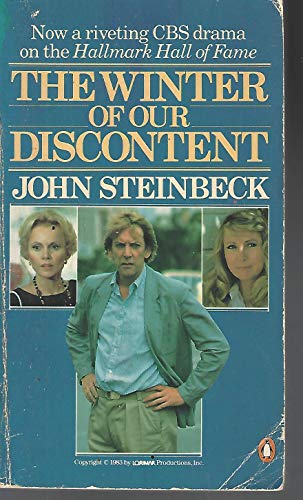
Through his choice of title John Steinbeck also alluded to Richard III by William Shakespeare of which Ethan quotes the respective passage at the end of part one. The Winter of Our Discontent is the author’s lament over moral decline in post-war America which manifested in a huge number of scandals making the headlines at the time of its writing and before.

He acts accordingly and the expected results materialise on Independence Day weekend 1960, but Ethan is full of remorse. Since he wants the best for them, he begins to question his attitude and convinces himself that it’ll do no harm to put aside his moral scruples at least temporarily – like he did as a soldier. Probably none of this would trouble Ethan, if the same day his wife and his teenage children didn’t make it clear to him that they too crave for money and the prestige it implies. So when a travelling salesman, previously announced by Mary’s attractive and men-hunting friend Margie Young-Hunt, offers him money behind Marullo’s back in return for placing orders with his company, Ethan refuses because he won’t betray his boss. As an honest man to the backbone Ethan won’t listen to him, though.

Coming by to check on the shop, Marullo points out to Ethan that a good businessman needs always to “look out for number one”, ie for money because it is at the heart of success and nothing else matters. Baker, president of the bank, drops in on Ethan to convince him to invest his wife’s six-thousand dollars and to restore his family to wealth, power and prestige, but Ethan refuses because it’s Mary’s money and security. On Good Friday morning on his way to work he meets the bank teller Joey Morphy who shares with Ethan his thoughts about how to rob a bank without getting caught. He hates his job that barely suffices to cover the expenses of his family consisting of his wife Mary, fourteen-year-old son Allen and thirteen-year-old daughter Ellen. In April 1960 Ethan still works as grocery clerk keeping the shop that he once owned. Harvard-bred only in letters and trained for war, not business, Ethan soon was forced not just to sell the shop, but also to stay on as the clerk of the new owner, an Italian immigrant called Alfio Marullo. Upon Ethan’s return from World War II, his father was dead and all that was left of the former wealth were the old Hawley house and the town’s grocery shop.

For generations his family belonged to the honourable and rich of fictitious New Baytown on Long Island, but when the whaling industry went down, also their decline began. Ethan Allen Hawley is a descendant both of the Pilgrim Fathers and of whalers, maybe even pirates, and thinks of his life as The Winter of Our Discontent.


 0 kommentar(er)
0 kommentar(er)
